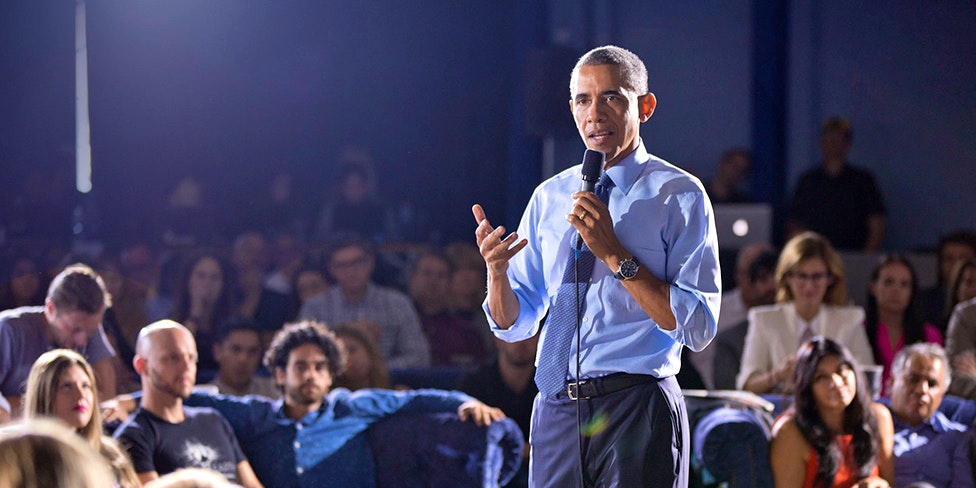President Obama's Plan for a Free and Open Internet

Today President Barack Obama has come out in favor of net neutrality in very public way. He lays out in no uncertain terms that he believes no cable company or access provider should be able to put limits on access to the Internet. In addition, he’s suggesting that the FCC recognizes access to the Internet as a basic utility, and something that Americans have a basic right to. This means no blocking, no throttling, more transparency and no paid prioritization.
Here are the four principles quoted directly:
-
No blocking. If a consumer requests access to a website or service, and the content is legal, your ISP should not be permitted to block it. That way, every player — not just those commercially affiliated with an ISP — gets a fair shot at your business.
-
No throttling. Nor should ISPs be able to intentionally slow down some content or speed up others — through a process often called “throttling” — based on the type of service or your ISP’s preferences.
-
Increased transparency. The connection between consumers and ISPs — the so-called “last mile” — is not the only place some sites might get special treatment. So, I am also asking the FCC to make full use of the transparency authorities the court recently upheld, and if necessary to apply net neutrality rules to points of interconnection between the ISP and the rest of the Internet.
-
No paid prioritization. Simply put: No service should be stuck in a “slow lane” because it does not pay a fee. That kind of gatekeeping would undermine the level playing field essential to the Internet’s growth. So, as I have before, I am asking for an explicit ban on paid prioritization and any other restriction that has a similar effect.
It doesn't matter whether you are on the "red team" or the "blue team" - this is a noble goal and one I hope everyone supports. An open Internet benefits us all in a myriad of ways and allows a free and open exchange of ideas across society. I'd urge you to read The Greatest Gift We Ever Had. Key quote:
...honest, inclusive conversation across a society will reliably lead to equality and higher quality of life, in any place it is allowed to happen.
My Thoughts:
-
There is one principle missing: No Content Modification. ISPs should not be allowed to modify any of the content they transport. This prevents them from injecting beacons, tracking code, advertising, etc. into web content that they are entrusted to deliver. This is happening and it needs to be stopped.
-
"Government Regulation" is known to increase costs, and potentially reduce growth and innovation. All things being equal I am in favor of less regulation rather than more regulation. We need to tread carefully as we seek to increase regulation to protect openness (bit of an oxymoron isn't it?).
-
We have to think carefully about the paid access issue. Does "no slow lanes" also mean "No Fast Lanes"? What if I want an ISP to provide a service where I get premium access to YouTube content, or Netflix content? Should that be illegal?
-
It is not a requirement that ISPs block unlawful content, rather it is a prohibition on blocking lawful content. But a strong enough prohibition on blocking lawful content (e.g., one which provides consequences whenever lawful content is blocked, even if the intent was to block unlawful content and the lawful content just got caught up in the filter) actually reduces the incentive for ISPs to attempt to identify and block unlawful content, since attempting to do so but making a misidentification in the process can result in penalties. In other words access to child pornography, terrorist information, and illicit drugs could actually increase as a result (i.e. "the law of unintended consequences").
Here is President Obama's Video
Update
As someone who considers himself a Republican It saddens me that this issue has become so polarized along party lines.
The only similarity to the Affordable Care Act is that Obama supports it. There may be a rational, reasoned arguments against Net Neutrality, but Republicans aren’t making them, and neither are the cable companies or cellular providers.
The main thrust seems to be "Government regulation of the Internet will be bad." And yet, we seem to have no issues regulating banks, power utilities, telephone companies and other utilities. The other argument seems to be the "slippery slope" argument - by introducing goverment regulation it is easy to envision that we will soon start regulating content. However, with our country's foundation on free speech I find that argument quite a stretch and exactly the opposite of Obama's first principle: "No Blocking".
Sources:

